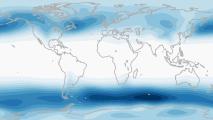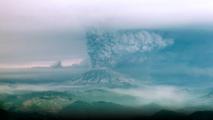Field: Planet Earth
A mineral produced by plate tectonics has a global cooling effect, study finds
Geologists have found that tectonic activity gives rise to smectite, a type of clay that can sequester a surprising amount of organic carbon.
Volcanic Iceland is rumbling again as magma rises
Volcanic eruptions in this region of Iceland tend to flow rather than being explosive, as residents have already experienced. A geologist explains.
The 2023 annular eclipse will have huge consequences 6 months later
Only twice a year are the conditions right for the Sun, Earth, and Moon to align in space: creating conditions for either solar or lunar eclipses.
There’s an entire solar system hiding inside Sweden
The Avicii Arena in Stockholm is the world’s largest spherical building and the center of the world’s largest scale model of our solar system.
Evidence suggests the world’s largest known asteroid impact structure is buried deep in southeast Australia
After years of asteroid impact research, experts think the world’s largest known impact structure is buried deep in the earth in Australia.
Reflecting sunlight to cool the planet will cause other global changes
MIT researchers find that extratropical storm tracks would change significantly with solar geoengineering efforts.
NASA mission to a $10,000-quadrillion asteroid is two months from launch
NASA hopes to get a glimpse at Earth's core by sending a spacecraft to 16 Psyche, an metal-rich asteroid 280 million miles away.
Theory proposes remnants of a destroyed planet lurk near Earth’s core
The two vast “blobs” buried in the Earth’s mantle could be the remains of a planet some believe crashed into Earth 4.5 billion years ago.
World’s oldest trees reveal the largest solar storm in history
One of the greatest threats to all our infrastructure is a solar storm, which has the potential to cause a multi-trillion dollar disaster.
A comet impact 13,000 years ago might have wiped out megafauna
Researchers note a "synchronicity" of geochemical signals suggesting that fragments of a comet struck Earth approximately 13,000 years ago.
How years of fighting every wildfire helped fuel the Western megafires of today
The current approach to fire management poses unnecessarily high stakes for forests. Here's why fighting every fire does more harm than good.
Record-breaking amount of Earth’s mantle drilled out of ocean floor
Scientists aboard the JOIDES Resolution have retrieved “a staggering” amount of mantle rock from below the ocean floor.
Understanding just how big solar flares can get
Recasting the iconic Carrington Event as just one of many superstorms in Earth’s past, scientists reveal the potential for even more massive eruptions.
Supercomputers revealed giant “pillars of heat” funnelling diamonds upwards from deep within Earth
Understanding Earth’s internal history can be used to target mineral reserves – not only diamonds, but also crucial minerals.
In the turbulent Drake Passage, scientists find a rare window where carbon sinks quickly into the deep ocean
The Drake Passage is one of the most turbulent ocean regions on Earth, but exploring it could help scientists understand how carbon sinks.
Why Earth is the only planet with plate tectonics
Here in our Solar System, of all the known planets, only Earth — not Mercury, not Venus, and not Mars — possesses plate tectonics.
Venus may have currently active volcanoes
Old images from NASA’s Magellan mission may have revealed that Venus, a close analogue to Earth, has volcanic activity.
Terraforming: why the Moon is a better target than Mars
While most of humanity's terraforming dreams have focused on Mars, a better candidate may be even closer: the Moon.
5 things you didn’t know GPS could do
You’d be surprised at all the things that GPS — the global positioning system that underlies all of modern navigation — can do.
Rewilding: letting nature do its own thing
Rewilding organisations in Europe are reintroducing lost species including the Eurasian lynx and Marsican brown bear.
“Galactic archeology” makes spectacular find: the Milky Way is over 13 billion years old
Scientists have pushed the Milky Way's early history back more than 2 billion years: to less than 800 million years after the Big Bang.
Earth’s magnetic field supports biblical stories of destruction of ancient cities
By utilizing the ancient orientation of the Earth’s magnetic field, scientists have been able to piece together the history of ancient Judea.
Are we living in a baby universe that looks like a black hole to outside observers?
If the black holes that form in our cosmos give birth to baby Universes, perhaps we arose from the formation of a black hole ourselves.
What the new Earth-threatening asteroid means for humanity
In a remarkable achievement, three new large asteroids have been found in the most elusive place: inside the orbit of Earth.
Discovery finds the Earth’s core is constantly changing the length our day
The length of our day changes slightly over a six-year period. This recent discovery has perplexed scientists for about a decade.
What is the largest planet out of all the ones we know?
The "upper limit" to the size of our planets is exceeded in other stellar systems, but double Jupiter's radius seems to be the limit.
Solar geoengineering could cool Earth, but some regions might continue warming
Some governments might try to “geoengineer” the planet by spraying substances into the upper atmosphere to reflect sunlight away from Earth.
Meanwhile, Antarctica’s snow is turning green
On the Antarctic Peninsula, so-called snow algae are turning the snow green, which could lay the groundwork for a whole new ecosystem.
Why does nature create patterns?
A physicist explains the molecular-level processes behind crystals, stripes, and basalt columns in nature.
Sea turtles in Seychelles have recovered from the brink
The green turtles of Seychelles – once almost hunted to extinction – are now thriving again thanks to conservation efforts.
This rock-bending tech may change clean energy
A technology that stores energy underground could make enhanced geothermal systems more cost competitive.
1.7 billion years ago, Earth had a natural nuclear reactor
Seventeen natural sites possessing ancient nuclear reactions have now been found: evidence of Earth's first nuclear reactor.
This logarithmic view of the Universe will blow your mind
From here to the limits of what we can see, here's a breathtaking illustrated logarithmic view of the Universe.
Breakthrough in photosynthesis boosts plant growth up to 30%
In a small study, researchers have engineered soy plants to have higher yields thanks to improved photosynthesis.
A large solar storm could knock out the power grid and the internet
Typical amounts of solar particles hitting the earth’s magnetosphere can be beautiful, but too much could be catastrophic.
Bad news for the 2022 hurricane season: The Loop Current is coming
The Loop Current, a fueler of monster storms, is looking a lot like it did in 2005, the year of hurricane Katrina.
Tapping into the million-year energy source below our feet
Quaise Energy wants to repurpose coal and gas plants into deep geothermal wells by using X-rays to melt rock.
The cosmos can kill us in many ways. But the James Webb Space Telescope can help save us
Asteroid strikes, supernova explosions, and gamma-ray bursts are just a few of the ways the cosmos can kill us.
This is the damage a tiny speck of space debris can do at 15,000mph
A crater 5 inches deep was caused by something about the size and weight of an eraser on the end of a pencil.
What happens if the Solar System’s largest comet collides with Earth?
The asteroid that caused the last mass extinction 65 million years ago was only 5 kilometers across — tiny compared to this one.
17 pictures that show how mind-bogglingly large the Universe is
Our entire planet is a little under 13,000 kilometers in diameter, or about seven orders of magnitude greater than the size of a human.
When will the Earth come to an end?
There are many different "ends" in store for our planet, in both the near and far future. Here are the ways our planet will meet its demise.
Spray-on “peel” for produce helps reduce plastic pollution
A Bill Gates-backed startup is helping reduce plastic pollution and food waste by coating produce in an edible spray.
A world map of private islands (some are a steal!)
Private islands exert a special attraction on the imagination. While they're often the realm of the rich, some are downright cheap.
What the world will look like in the year 250,002,018
On Pangaea Proxima, the supercontinent of the future, Cape Town and Mexico City are just a day’s drive apart.
This company is tackling Kuwait’s ‘tire graveyard’ problem by tire recycling
Kuwait wants to build 25,000 new houses on the site of a former tire graveyard. Here's how they're going to do it.
An asteroid could wipe out an entire city – here’s NASA’s plan to prevent catastrophe
Cosmic bodies, like asteroids and comets, are constantly zooming through space and often crash into our planet.
Online tree of life now connects 2.2 million living species
OneZoom is an interactive “tree of life” that lets you explore the evolutionary connections between more than two million species.
Series|
Make It Count
How biomaterials could save the planet
In partnership with Million Stories
By 2050 there will be more plastic than fish in the ocean. But biomaterials may be the solution.
How to slay a hurricane
Hurricanes are becoming more powerful — can scientists engineer a way to weaken them and save lives?
A startup is stuffing teddy bears with recycled cigarette butts
Indian startup CODE Effort has developed a process for recycling cigarette butts, the world’s most littered objects.
E. coli turns plastic waste into vanillin
Scientists have engineered E. coli bacteria to convert plastic waste into vanillin, an in-demand compound used in vanilla flavoring and more.
More than 5,000 tons of space dust hit Earth every year
We now know about how much space dust — micrometeorites that may have seeded Earth with the ingredients for life — hits the planet every year.
Light-driven levitation could lift probes to the edge of space
A new light-driven levitation technique can lift objects large enough to carry sensors to the understudied mesosphere near the edge of space.
How ‘mental time travel’ can lead us to sustainability
Bina Venkataraman, author of The Optimist's Telescope, believes that modern society’s shortsightedness is the root of many avoidable catastrophes.
Series|
Guardians of the Apocalypse
Will we ever predict earthquakes?
In 2010, an earthquake killed 222,570 people in Haiti, injuring 300,000 and displacing over a million. In an attempt to discover how to predict earthquakes, these researchers are using machine learning to analyze the acoustic data from tectonic plates.
Series|
Guardians of the Apocalypse
Could the human race survive a supervolcano?
The eruption of Mount Tambora pushed humanity to the brink of extinction. Today, active supervolcanoes still have the power to nullify our future. What can we do to prepare?
The fleet of underwater drones probing Earth’s interior
The Earth’s interior may be the last wild frontier, but not for long. These underwater drones are scanning the ocean to create a 3D model of its internal dynamics.
The robot racing to study Antarctica’s massive ice melt
Icefin, a semi-autonomous research vessel, is on a mission to search for clues about one of the continent’s fastest melting glaciers, the Thwaites Glacier.
Diversity in the outdoors: bridging the adventure gap
This DC nonprofit is defying statistics by promoting diversity in the outdoors and connecting people from all walks of life with the wonders of nature.
NASA wants YOU to help track landslides
NASA is enlisting citizen scientists to collect important data on recent landslides, in an effort to improve prediction models and assist in disaster prevention.





























































